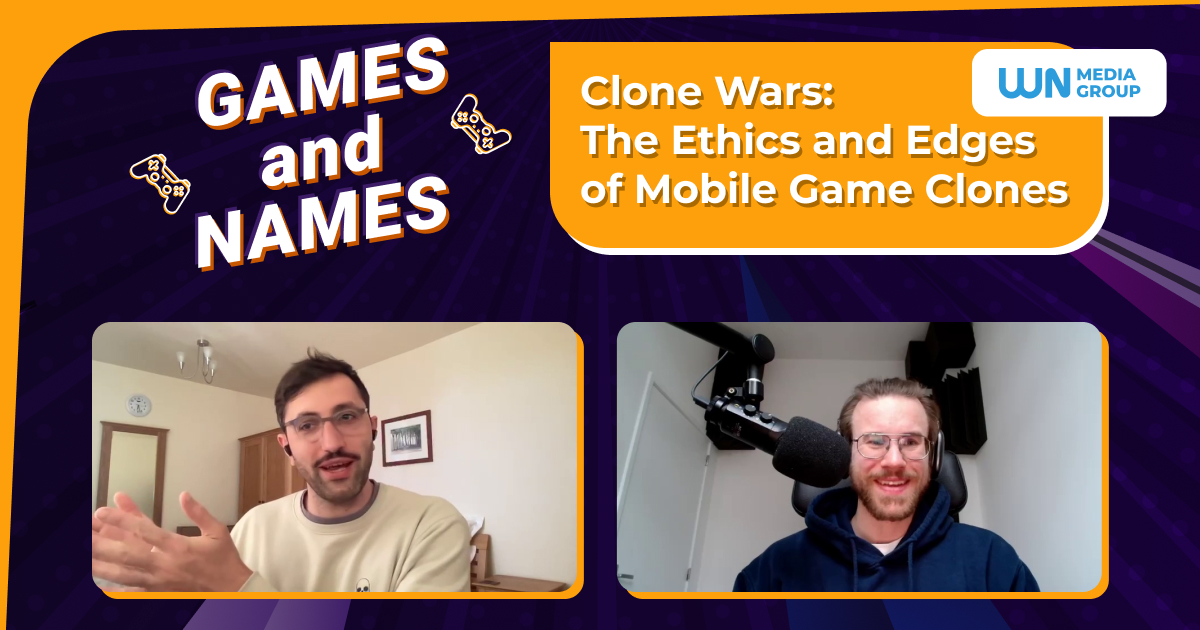New month, new episode of Games and Names — a podcast about the games industry from AppMagic (launched in partnership with WN Media Group). It features Product Madness senior game designer Jesse Kroon discussing the issue of game clones, as well as the fine line between drawing ideas to create new experiences and dishonestly copying other titles.

Kroon, who also has a master’s degree in game design and wrote a dissertation on the Nemesis system in Shadow of Mordor, shared his perspective on cloning with Games and Names host, AppMagic VP of product Stan Minasov.
Below are the key takeaways from the conversation, but to get the big picture, listen to the second episode in full on:
What is the difference between “good” and “bad” game clones?
At a higher level, we can identify clones as duplicates of already existing games. But according to Kroon, there are two types of clones:
- “Clones without honor” — they usually take every part of a particular game and replicate it without spending any creative energy on it, so it is basically about stealing someone else’s ideas;
- Clones that respect the game mechanics of titles that came before — this applies to projects with the same core mechanics, the same metas, or the same combinations of core and meta, so it is more about drawing ideas and inspiration from other games but adding your own creative spin to them and changing some aspects.
“If you made a game called not Survivor.io, but Survivor.oi that looked exactly the same and played exactly the same, had the same art style and stuff, that what I would describe as a ‘bad clone’. And I don’t think we should be interested in doing that as the industry,” Kroon explained.
Why do developers clone other mobile games?
Kroon thinks that the motivation behind cloning is speeding up the amount of time it takes to make a game. So instead of testing new ideas both through prototyping and putting a project in front of real players, a company can take something that already works in the market to save resources and reduce risks.
However, Kroon also believes that there is nothing bad in adopting the best practices in the industry. For example, you can build upon some elements of Gardenscapes to add them to your own Match-3 title. But there is a fine line between using proven mechanics for your original project and quickly trying to create a complete clone to ride the hype.
Why do most clones fail?
According to AppMagic, those “clones without honor” usually can’t succeed in the market. There was a huge wave of Archero clones a few years ago, with dozens of games trying to fully copy the original and grab a piece of the pie. But overall, all of them earned less than 5% of Archero’s revenue.
It is also worth noting that the simpler the new hit game may seem at its core, the more companies will try to copy it. That’s why cloning usually happens in casual and hypercasual genres. But there is little to no chance of someone deciding to clone a successful 4X strategy due to the complexity of the genre.
As Minasov pointed out, one of the reasons why clones usually fail is that some devs forget that even creating a 100% clone requires decent game development experience. You should be really confident in your skills and expertise to change essential elements that already worked in the original for the better. Otherwise, you may end up ruining the whole experience.
Of course, there are exceptions. For example, Gossip Harbor may look like a rip-off of Love & Pies, but at launch it had better monetization and more complex live ops. As a result, the growth of the Revenue per Download (RpD) metric was much higher compared to the original.
Another way to copy ideas and succeed in the market is to attract an audience that is not usually interested in a particular genre. Most Merge games target female players, but Medieval Merge developer Pixodust Games designed its game specifically for the male audience. So instead of cooking and decorating, its marketing campaign was focused on fighting monsters and building a kingdom. While its core gameplay was identical to other Merge titles, the studio was able to find a new target audience in the niche.
Is cloning a totally unacceptable practice?
Kroon thinks the term “clone” has a very clear, dirty connotation. And it usually applies to situations when devs try to parasitize on the success of a particular game by quickly copying the entire experience just because they can.
However, Kroon has no problem with companies like Habby, a publisher of Archero and Survivor.io, iterating with the ideas they know work and creating new combinations of already proven mechanics. So this approach is part of the creative process and can sometimes drive further innovation and generate new ideas.
That's how we drive our industry forward. That's at least how it has been done in the past. I like that about the games industry — we are all working together on making the best experience and we are competing against each other. And the market follows the version of that experience that is giving players the most joy, that is connecting with them the most. It goes back and it goes forth. I don't have any problem with that. To call that cloning is to give it a negative connotation when I don't think it deserves it. Senior game designer at Product Madness
For more insights into mobile game clones, watch the full episode of the Games and Names podcast below.
